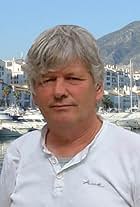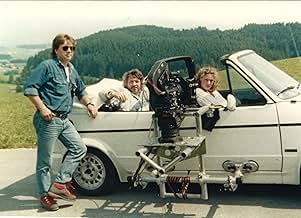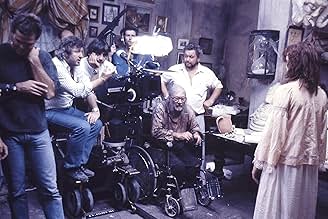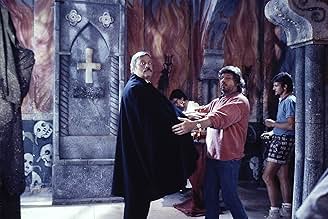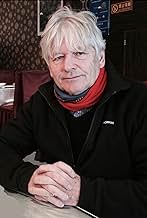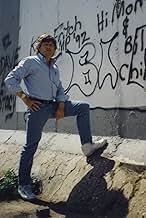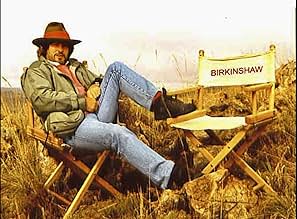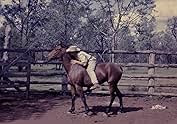Alan Birkinshaw
- Director
- Writer
- Second Unit Director or Assistant Director
Alan Birkinshaw started his working career as a Jackaroo in Australia.
Soon afterwords he became a horse breaker and then a rodeo rider. He
returned to the UK and on his 20th birthday joined Lew Grade's ATV as
a television cameraman working on mainstream dramas and light
entertainment shows. After 18 months he left ATV and became a
freelance TV cameraman. At age 22 he directed and produced his
first television drama, "A Nice Dream While It Lasted", written by his
sister, renowned author Fay Weldon. At 24 Birkinshaw
was directing television programs for Westward Television and then
London Weekend Television, including quiz shows, farming
programs, live television news shows and drama. He directed a ground-breaking, before-its-time, light entertainment show beamed down to the
UK from a circling airplane. This was for a pirate TV station run by
the then infamous Ronan O'Rahilly, who began the first-ever pirate
radio station, Radio Caroline, in the 1960s. Soon after that he turned to documentaries and commercials and then moved into the world
of feature films.
One of his first theatrical films was a horror movie, Killer's Moon (1978), which he also produced and co-wrote with Fay Weldon. This has since become a cult film, attracting a certain amount of controversy, and 30 years after its production is being studied in universities and other film courses. Next, a short film called Dead End (1980), which Birkinshaw also wrote and directed. It was the first film for the multi Oscar-nominated composer George Fenton. The film had a major release in the UK and went on to be shown all around the world. After another two short films, "Henley" and "The Circus", Birkinshaw went to the Philippines to make an action-adventure movie called "Greed" (eventually released as Invaders of the Lost Gold (1982)), starring Stuart Whitman, Harold Sakata and Edmund Purdom. It wasn't easy getting finance for movies in England, and he soon went back to making commercials, at the same time setting up his own film distribution and production company, West World Films. Birkinshaw was Additional Director (uncredited) on Ordeal by Innocence (1984). starring Donald Sutherland. Soon afterwards Birkinshaw found himself in India making a dramatized documentary on the life of India's first Prime Minister, Jawaharlal Nehru. This was commissioned by the then Prime Minister, Rajiv Gandhi, and caused questions to be asked in the Indian Parliament. By now Birkinshaw was getting a reputation for tough assignments and he was called in to direct an action series called Zorc (1992) with the volatile German actor Klaus Löwitsch. After this was finished, Birkinshaw was in Africa with more tough actors. 'Oliver Reed' in The House of Usher (1989) was just one of them. In a Swiss/German/ French co-production Birkinshaw directed the true story of a Swiss boxer in Punch (1993) starring Donald Sutherland . The boxing sequences in this movie were hailed as extraordinary given the time and the budget. The hugely budgeted Space Precinct (1994) and its famous action sequences with the Cyborg which Birkinshaw directed was followed by more work in Germany and saw Birkinshaw directing 90-minute comedy dramas for German television--a series called Die Unbestechliche (1994) starred Maja Maranow and Martin Benrath.
Birkinshaw has won many awards for his work, and has been writing screenplays, a novel and directing occasionally. He also has a thriving business producing and selling marble statues to customers all over the world.
One of his first theatrical films was a horror movie, Killer's Moon (1978), which he also produced and co-wrote with Fay Weldon. This has since become a cult film, attracting a certain amount of controversy, and 30 years after its production is being studied in universities and other film courses. Next, a short film called Dead End (1980), which Birkinshaw also wrote and directed. It was the first film for the multi Oscar-nominated composer George Fenton. The film had a major release in the UK and went on to be shown all around the world. After another two short films, "Henley" and "The Circus", Birkinshaw went to the Philippines to make an action-adventure movie called "Greed" (eventually released as Invaders of the Lost Gold (1982)), starring Stuart Whitman, Harold Sakata and Edmund Purdom. It wasn't easy getting finance for movies in England, and he soon went back to making commercials, at the same time setting up his own film distribution and production company, West World Films. Birkinshaw was Additional Director (uncredited) on Ordeal by Innocence (1984). starring Donald Sutherland. Soon afterwards Birkinshaw found himself in India making a dramatized documentary on the life of India's first Prime Minister, Jawaharlal Nehru. This was commissioned by the then Prime Minister, Rajiv Gandhi, and caused questions to be asked in the Indian Parliament. By now Birkinshaw was getting a reputation for tough assignments and he was called in to direct an action series called Zorc (1992) with the volatile German actor Klaus Löwitsch. After this was finished, Birkinshaw was in Africa with more tough actors. 'Oliver Reed' in The House of Usher (1989) was just one of them. In a Swiss/German/ French co-production Birkinshaw directed the true story of a Swiss boxer in Punch (1993) starring Donald Sutherland . The boxing sequences in this movie were hailed as extraordinary given the time and the budget. The hugely budgeted Space Precinct (1994) and its famous action sequences with the Cyborg which Birkinshaw directed was followed by more work in Germany and saw Birkinshaw directing 90-minute comedy dramas for German television--a series called Die Unbestechliche (1994) starred Maja Maranow and Martin Benrath.
Birkinshaw has won many awards for his work, and has been writing screenplays, a novel and directing occasionally. He also has a thriving business producing and selling marble statues to customers all over the world.
